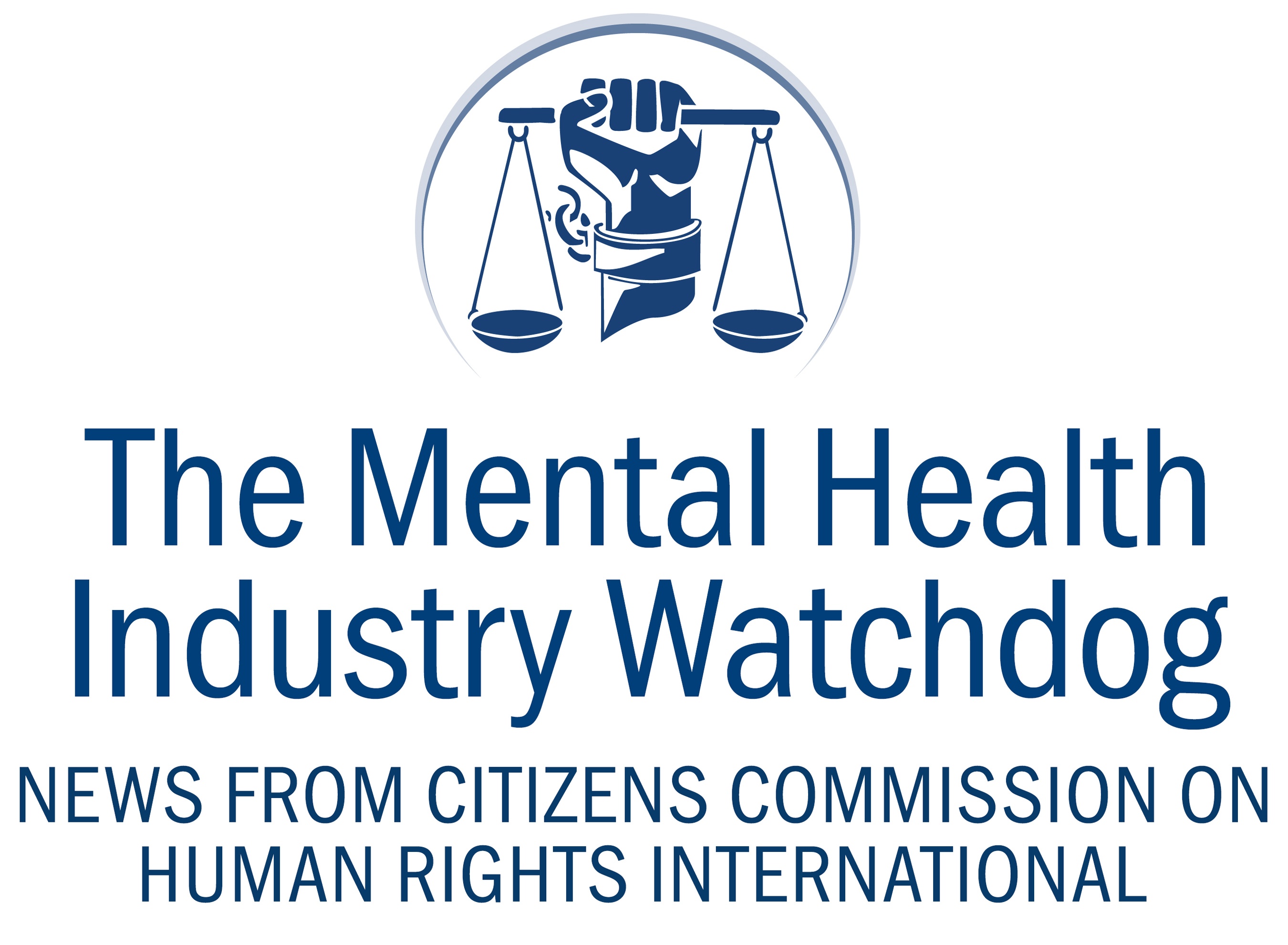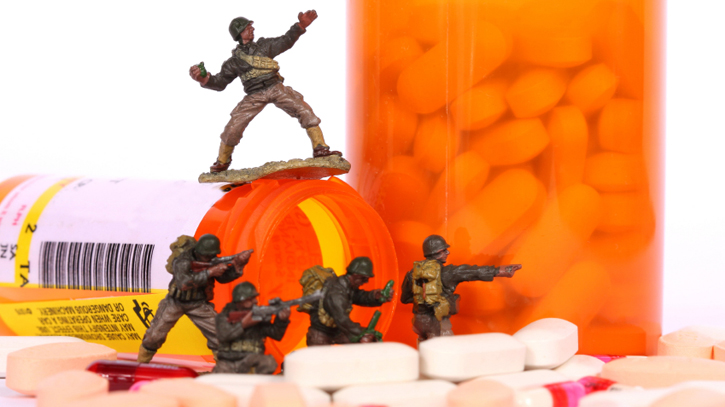On August 21st, U.S. Rep. Mike Coffman wrote a letter to the Government Accountability Office (GAO) to try and move the Department of Veterans Affairs away from prescribing “strong” psychotherapeutic medications to veterans. Motivated by two stories of Colorado veterans, Rep. Coffman specifically asked the GAO to review and report back on the VA’s drug-centric approach to PTSD, including a host of issues related to the amounts and types of medications being prescribed, the process being used to track treatment plan compliance and standards of practice. He further asked the GAO to evaluate the possible correlation between the use of prescription medications for the treatment of mental health conditions and veteran suicide rates. He closed by asking about the extent of VA’s use of cognitive behavior and other therapies in lieu of medications.[1]
This is an important request. There is a balance to be found in the VA between ‘cookie cutter’ (meaning everyone gets exactly the same care) medicine and personalized protocols. That balance includes the development and implementation system-wide of standards of care and standard operating procedures.
One area Rep. Coffman is focused on is Post Traumatic Stress Disorder (PTSD). Related to this, there are two of the standards of care that hopefully the GAO will review and include in their report:
- If these veterans had received a full medical evaluation before psychiatric medications were prescribed.
- If veterans with a PTSD diagnosis or treatment program were also evaluated for Traumatic Brain Injury (TBI).
The GAO will study specifically the request provided to them by the member of Congress, and as important as the request that Rep. Coffman made, it is incomplete. If the GAO is to take up this issue, there are some very specific data points that should be studied.
The evaluation should be of both the DOD and VA. Using the same standard of evaluation for both and reporting both side by side. For both for each year for the last 20 years (to show the trend for pre-global war on terror forward):
- The numbers of prescribed psychotherapeutic, psychotropic, antidepressant (i.e. mental health) drugs each year, by drug.
- The numbers of active duty soldiers and veterans prescribed a mental health drug.
- The number of active duty soldiers and veterans prescribed more than one mental health drug while also prescribed an opioid.
- The number of active duty soldiers and veterans prescribed an opioid.
- The number of active duty soldiers and veterans prescribed an opioid for more than 30 days in a year.
- The number of active duty soldiers and veterans who committed or attempted suicide each year.
- Of these, the number of those who were on (a) one psychotherapeutic medication, (b) more than one psychotherapeutic medication, (c) an opioid medication, (d) a mix of psychotherapeutic medication and opioids, (e) had been on psychotherapeutic medications but had stopped suddenly, and (f) had not been on any prescription medication.
- How many of these had the dual diagnosis of TBI/PTSD.
Why does this matter? Because the actual system-wide integration of complementary therapies and other non-mainstream options that offer benefit from everything from Traumatic Brain Injury to pain to Post Traumatic Stress is not happening.
According to the VA’s own Clinical Practice Guideline for PTSD, evidence now shows that one frequently used class of drugs do the reverse: “benzodiazepines, may interfere with the extinction of fear conditioning or potentiate the acquisition of fear responses and worsen recovery from trauma.”[2]
Retired Army Colonel and psychologist, Bart Billings, who has since 1994 hosted a conference on combat stress recovery, says, “PTSD isn’t a disorder. Ninety-nine percent of anybody that goes into combat is experiencing Post Traumatic Stress. It’s a normal reaction to being in an abnormal environment.”[3] Dr. Billings’ focus is not on prescribing psychiatric drugs, but rather on non-Rx solutions to managing stress before it becomes a “diagnosis.” It can be frustrating to know good people with great solutions that the VA and DOD have not adopted system wide. Why does looking at the VA’s drug-centric approach to PTSD matter. These statistics offer a glimpse:
- In 2010, 1.85 million veterans filled at least one prescription for a psychotropic drug.[4]
- From 2001 through 2011, the VA spent $1.64 billion just on benzodiazepines and the antipsychotics Risperdal and Seroquel.[5]
- Thirty-seven percent of recent war veterans are being diagnosed with PTSD and 80 percent of those are prescribed a psychiatric drug.[6] Of these vets, 89% were prescribed antidepressants and 34% were prescribed antipsychotics.[7]
- The VA’s mental health budget has shot up from about $3 billion in 2003 to $7.5 billion in 2016.[8]
Every day, mainstream medicine acknowledges things many of those involved in alternative health accepted long ago—there are many factors that affect behavior and mental health. Heavy metal and other toxic exposures; food allergies or sensitivities; a lack of certain nutrients; and hormonal imbalances such as an undiagnosed thyroid disorder are examples of things that directly affect moods and behavior.[9]
There will come a time when mainstream medicine is going to step back and realize that mental health issues do not separate the head/brain from the rest of the body. It is one of the reasons holism in health care is so important. There must come a time soon when the DOD and the VA move away from the drug-centric approach and evolve into more holistic, non-drug approaches that focus on whole person healing, not just symptom suppression. That transition will take place with the help of good data analysis by the GAO. Thank you, Rep. Coffman for getting this ball rolling.
A portion of the last paragraph of President Abraham Lincoln’s second inaugural address stands as the mission of the VA and the context has modern significance:
“With malice toward none, with charity for all, with firmness in the right as God gives us to see the right, let us strive on to finish the work we are in, to bind up the nation’s wounds, to care for him who shall have borne the battle and for his widow and his orphan, to do all which may achieve and cherish a just and lasting peace among ourselves and with all nations.”[10]
References:
[1] https://coloradopolitics.com/u-s-rep-mike-coffman-raises-concerns-va-drug-centric-culture-veterans/#lightbox/1/
[2] http://news.cchrint.org/2017/08/18/cannot-drug-person-back-feeling-safe-polypharmacy/; VA/DOD Clinical Practice Guideline for the Management of Posttraumatic Stress Disorder and Acute Stress Disorder, p. 57, https://www.healthquality.va.gov/guidelines/MH/ptsd/VADoDPTSDCPGFinal082917.pdf.
[3] “Let’s Stop Using Experimental Vaccines and Psych Drugs that are Destroying our Veterans and Military Personnel,” Health Impact News, 2014, http://healthimpactnews.com/2014/lets-stop-using-experimental-vaccines-and-psych-drugs-that-are-destroying-our-veterans-and-military-personnel/.
[4] Ilse R. Wiechers, MD, MPP, et al., “Increased Risk Among Older Veterans of Prescribing Psychotropic Medication in the Absence of Psychiatric Diagnoses,” Am J Geriatr Psychiatry, Jun 2014.
[5] “VA/Defense Mental Health Drug Expenditures Since 2001,” May 2012 Drug Totals, Government Executive, http://cdn.govexec.com/media/gbc/docs/pdfs_edit/051712bb1_may2012drugtotals.pdf.
[6] Susan Donaldson James, “Marines Battalion Mentally Upbeat, Despite Record Deaths,” ABC News, April 15, 2011, http://www.abcnews.go.com/Health/camp-pendleton-marine-battalion-mentally-fit-deadliest-war/story?id=13377215; Mohamed S, Rosenheck RA, “Pharmacotherapy of PTSD in the U.S. Department of Veterans Affairs: diagnostic- and symptom-guided drug selection,” Journal of Clinical Psychiatry, 2008, June Vol. 69, No. 6, pp. 959-65, http://www.ncbi.nlm.nih.gov/pubmed/18588361.
[7] Mohamed S., et al., “Pharmacotherapy of PTSD in the U.S. Department of Veterans Affairs: diagnostic- and symptom-guided drug selection,” J Clin Psychiatry, Jun 2008, https://www.ncbi.nlm.nih.gov/pubmed/18588361.
[8] John Ramsey, “The Last Battle: Steven Chadduck lost his home and nearly committed suicide while waiting for help for PTSD,” Fayetteville Observer, Sept. 24, 2012; Leo Shane III, “Budget deal nails down fiscal 2016 spending for DoD, VA,” Military Times, 16 Dec 2015, http://www.militarytimes.com/story/military/2015/12/16/budget-omnibus-fy16-defense-veterans-affairs-pentagon/77416466/.
[9] Orish Ebere Orisakwe, “The Role of Lead and Cadmium in Psychiatry,” North American Journal of Medical Sciences, 2014 Aug; 6(8): 370–376; Genuis SJ, “Toxic causes of mental illness are overlooked,” Neurotoxicology, 2008 Nov;29(6):1147-9; Martin Teufel, et al., “Psychological burden of food allergy,” World Journal of Gastroenterology, 2007 Jul 7; 13(25): 3456–3465; T. S. Sathyanarayana Rao, et al., “Understanding nutrition, depression and mental illnesses,” Indian Journal of Psychiatry, 2008 Apr-Jun; 50(2): 77–82; D Ramsey, MD, “Vitamin deficiencies and mental health: How are they linked?,” Current Psychiatry, 2013 Jan; 12(1):37-44; Jory Goodman M.D., “Hormone Imbalance, Not Bipolar Disorder,” Psychology Today, Oct 15, 2013; Thomas D. Geracioti Jr., MD, “Identifying hypothyroidism’s psychiatric presentations,” Current Psychiatry, 2006 Nov.; 5(11):98-117.








Leave A Comment
You must be logged in to post a comment.